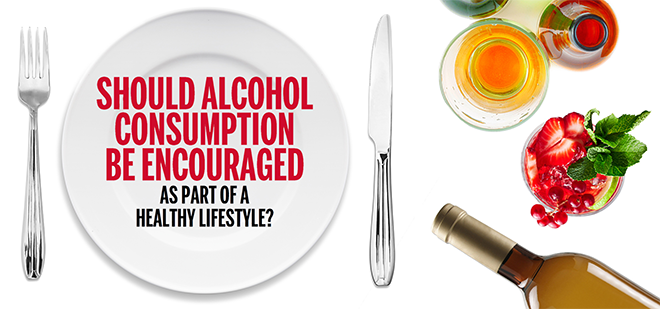To Drink or Not to Drink? At Bicknell, Debate Over Health Benefits of Moderate Alcohol Consumption.
 Over the past 30 years, more than 100 studies have shown positive cardiovascular effects from moderate alcohol consumption of one or two drinks per day.
Over the past 30 years, more than 100 studies have shown positive cardiovascular effects from moderate alcohol consumption of one or two drinks per day.
But whether those studies warrant a larger public health message encouraging moderate drinking is a subject of intense debate in scientific circles. Proponents say physicians and others should portray light consumption as potentially protective, while also acknowledging the risks. Critics say the supposed benefits of moderate drinking have been overblown and are based on flimsy science.
The debate came to BUSPH on Thursday, when four well-known researchers squared off on the topic at the annual William J. Bicknell Lectureship in Public Health. The consensus: Definitely don’t drink too much.
But could there be a down side to drinking too little?
“Anything that we can do to lower the risk of a stroke, diabetes, dementia or osteoporosis can make a contribution to public health,” said Dr. R. Curtis Ellison, a BU professor of medicine and public health who advocates moderate alcohol consumption as part of a healthy lifestyle.
That view drew a sharp response from addiction researcher Dr. Richard Saitz, chair of BUSPH’s community health sciences department and a professor of medicine at BUSM.
“Alcohol is a pharmaceutical intervention that is also a carcinogen. We generally don’t recommend such (substances) in any doses,” Saitz said. “Are there harms of low doses of alcohol? Yes.”
Both sides came armed with research. In the academic version of a bar brawl, Ellison took the first shot, referencing dozens of studies showing that moderate drinking reduced the risk of heart disease and other cardiac ailments, and was associated with lower overall mortality.
Saitz fired back with studies showing a link between moderate drinking and elevated risks of some cancers, including breast cancer, while criticizing the studies Ellison cited as “hopelessly confounded,” “implausible” and “flawed.”
Joining Ellison to tout the benefits of moderate drinking was Lionel Tiger, an anthropologist from Rutgers University and author of several books on social evolution, including The Pursuit of Pleasure. Tiger argued that drinking has been part of American culture since the Pilgrims came to Plymouth and should be seen as a “facilitating mechanism” for socialization and stress reduction.
“Yes, the epidemiological studies are fine,” Tiger said, acknowledging scientific support for both sides. “But at the same time, you have to . . . embrace (moderate consumption) as a way of recognizing that, for most people, living is not easy.”
Drinking to cope is “a self-delusion, no doubt — but for whatever reason, it makes people feel that things are a little easier,” he said.
But Saitz and Dr. Timothy Naimi, associate professor of medicine and public health, said any social or health benefits associated with moderate drinking are outweighed by the potential risks. They noted that about half of all drinkers in the U.S. exceed the suggested limits of consumption in U.S. Dietary Guidelines – one drink per day for women, and two drinks for men.
“We can’t pretend that everyone would drink moderately, were alcohol promoted as part of a healthy lifestyle,” Naimi said. “Even if we assume (cardiovascular) benefits from low-dose drinking, alcohol causes more deaths and lost life than it prevents.”
Excessive alcohol consumption is linked with serious health problems such as cirrhosis of the liver, inflammation of the pancreas, and damage to the heart and brain. Heavy consumption also increases the risk of motor vehicle accidents, high blood pressure, stroke, violence and suicide, studies have shown.
“Any ‘benefit’ (of light drinking) is lost with one heavy-drinking episode,” Saitz argued.
Naimi said a new set of genetic-based studies have challenged the concept that moderate drinking has a “cardio-protective” effect. Until there is definitive research proving a link — without confounding factors – the public health community would be wrong to promote alcohol as a “health tonic,” he said.
Ellison, who is scientific co-director of the International Scientific Forum on Alcohol Research, said he advocates a “balanced view” of moderate drinking. He is best known for his research on the so-called ‘French Paradox,’ in which he and others cited red wine consumption as a reason the French have low rates of coronary heart disease. After a ’60 Minutes’ segment on that topic in 1991, in which he appeared, red wine sales in the U.S. climbed by 40 percent.
“I think the message is, don’t drink too much – but don’t drink too little, either,” Ellison said. “Telling the truth about alcohol” is not going to cause people to abuse it.
But Naimi and Saitz said that promoting the supposed benefits of moderate drinking was fraught with problems, including that different people might interpret “moderate” in vastly different ways. They also disputed Tiger’s view of alcohol as a social elixir.
“Remember that alcohol is tremendously socially disruptive,” Naimi said.
Saitz was more blunt: “Frankly, heroin is pretty good as a social lubricant,” he said.
As the debate wound down, Tiger tried to strike a compromise.
“I think we owe it to ourselves to not look at this as ‘Thou Shalt’ or ‘Thou Shalt Not,’” he said.
All four researchers agreed that excessive drinking should be discouraged, no matter what the circumstances. Heavy alcohol use led to an estimated 88,000 deaths in the U.S. each year from 2006 to 2010, according to the Centers for Disease Control and Prevention.
They also conceded that any public messaging about drinking could be tricky, given that 60 to 80 percent of the U.S. population already reports alcohol consumption.
“Who would be eligible to start drinking?” Saitz asked.
The Bicknell lecture is an annual event, hosted by SPH, in memory of Dr. William J. Bicknell, founder of the Department of Global Health. He died in 2012.
Martha Werler, chair of epidemiology, moderated the debate.
Submitted by Lisa Chedekel